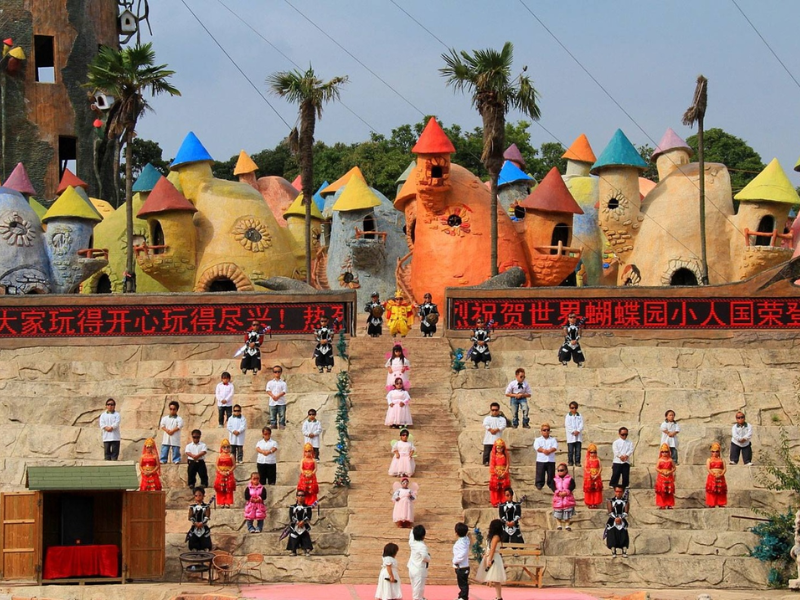
Nestled in the lush hills of Xishan, near Kunming, the capital of China’s Yunnan Province, lies the Kingdom of the Little People. This whimsical park, home to more than 90 individuals with dwarfism, is both a workplace and a residence, existing as a colourful, fairy-tale-inspired amusement park.
It’s a place that sparks curiosity and raises eyebrows. Is it a haven for empowerment and employment? Or is it an ethically questionable attraction turning people into a spectacle?
As I dug deeper into the Kingdom of the Little People, I couldn’t help but wonder: does this park provide its residents with a unique sense of community, or does it reinforce harmful stereotypes about disabilities?

A Whimsical Wonderland
The park opened in 2009 as part of the World Butterfly Ecological Park. It features fairytale houses, castles, and even a replica of The Shire from The Lord of the Rings. Its grounds stretch over 3,500 square metres, making it a sprawling wonderland for visitors.
A visit to the park costs about 170 RMB (roughly R450), giving tourists access to the quirky village and a variety of performances by the residents. The shows range from slapstick comedy and fairy tale re-enactments to daredevil stunts like tightrope walking, performed without safety equipment.
Walking through the park, you’d see people working on crafts, mingling with tourists, or taking a break in mushroom-shaped houses. Every detail of the park is designed for accessibility, from smaller furniture to lower door handles and sinks.
The Vision Behind the Kingdom
The park was the brainchild of Chen Mingjing, a real estate mogul from Sichuan. He claims the idea struck him after meeting two individuals with dwarfism on a train who had been ostracised by their families and left to fend for themselves. Chen envisioned a space where little people could live and work in a supportive environment.
It’s a noble intention on the surface, but the execution has sparked global debate. The park currently houses around 80 people, with applicants coming from across China. Residents must meet specific criteria: they must be under 130 centimetres tall, under 50 years old, and free of infectious diseases.
The residents earn a monthly wage ranging between R2,500 and R7,500, along with food and accommodation. However, the wages are reportedly paid from a third-party charity fund rather than by the park itself, raising further questions about its business model.



Ethical Questions: A Community or a Spectacle?
Supporters argue that the park offers individuals with dwarfism a safe place to live and work, free from the societal stigma they often face in China. With limited vocational opportunities and significant barriers to education and employment, many little people struggle to make ends meet.
But critics liken the park to a modern-day freak show, questioning whether it isolates its residents rather than integrating them into broader society. Organisations such as Little People of America and Handicap International have voiced strong opposition to the park’s concept, comparing it to a zoo.
Even the park’s founder, Chen, doesn’t shy away from the park’s controversial reputation. “I wanted to help them,” he told Time magazine. “But many people don’t see it that way.”
Life Inside the Kingdom
The park’s residents live on-site in a village-like setting, complete with small-scale houses and facilities tailored to their needs. While this may sound idyllic, it raises concerns about segregation. Is it truly empowering for the residents, or does it further isolate them?
Performers have varying opinions about their roles. Some express gratitude for the chance to live and work in a supportive environment, while others quietly question the nature of their work and the reactions it elicits from visitors.
The cultural context matters here. Dwarfism is often misunderstood in China, and many little people face discrimination. By creating a community, the Kingdom of the Little People provides a sanctuary of sorts. But should we celebrate a system that forces individuals into such settings to survive?


A Broader Issue
The park isn’t an isolated case. Across China, other initiatives have emerged to provide employment for little people, including travelling circus troupes. These ventures often receive similar backlash, accused of exploiting disabilities for profit.
China categorises dwarfism as a Level 4 disability—a classification indicating a lesser impairment that allows for independent living. However, this classification also means individuals with dwarfism receive fewer government benefits and face challenges in accessing resources.
For many, the Kingdom of the Little People offers stability that they wouldn’t find elsewhere. But at what cost?
Expansion Plans Amid Growing Scrutiny
Despite criticism, the park has ambitious plans for growth. Chen hopes to expand the Kingdom to accommodate up to 1,000 residents. The construction of a high-speed train line connecting Kunming to popular tourist destinations is expected to bring more visitors.
However, these plans only intensify the ethical debate. Critics argue that expansion could further entrench the park’s problematic premise, while supporters see it as a way to offer more people a stable livelihood.

Final Thoughts: A Question of Ethics
The Kingdom of the Little People is a place that defies easy categorisation. On one hand, it offers employment, housing, and a sense of community to a marginalised group. On the other, it perpetuates a narrative that people with dwarfism are novelties to be gawked at.
As I read about this place and its residents, I couldn’t help but feel conflicted. Is this park truly a sanctuary, or is it a spectacle designed for profit? Does it empower its residents, or does it exploit them under the guise of providing opportunities?
In the end, perhaps the question we need to ask is whether such initiatives address the root causes of marginalisation or merely offer a band-aid solution. Until society creates inclusive systems that provide equal opportunities for all, places like the Kingdom of the Little People will continue to provoke debate—and challenge our understanding of what it means to empower marginalised communities.



